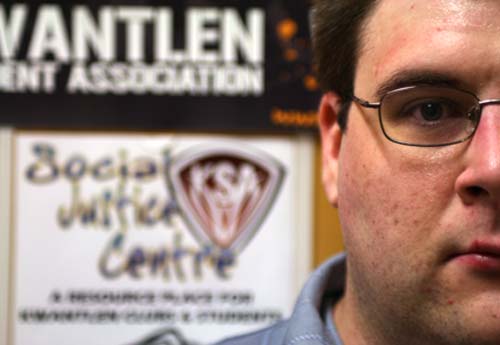Liaison quits KSA over social justice spending decision
October 20, 2009 by Mitch Thompson · 4 Comments

Ken McIntyre has resigned as a student liaison after a KSA decision over an referendum-approved charge for a Social Justice fund. (Mitch Thompson photo)
Student liaison Ken McIntyre has resigned from his position on the Kwantlen Student Association council to protest the handling of a referendum-approved 10-cents-a-credit fee to fund the Social Justice Centre.
McIntyre, who had been the liaison to the KSA for students with disabilities, one of seven positions that focus on social justice issues at the university, resigned Oct. 6 after the KSA voted to remove the 10-cent-a-credit fee from Social Justice and increase the KSA’s building fee from 25 cents a credit to 35 cents.
The social justice fee was approved in the September referendum and would have been used to fund the liaisons and their Social Justice Centre, rather than having their budget come from KSA operating funds.
Derek Robertson, director of external affairs, made the motion to remove the Social Justice fee and increase the student union building fee instead.
“His rationale was that we still had a budget for the previous year, even though it was taken out of the KSA operating expenses,†said McIntyre.
Because of the KSA’s self-imposed student-fee-increase limit of 15 per cent (or $1.56 for next year) a year, the KSA council would be unable to introduce the social justice fee as well as raise the building fee.
McIntyre fears that removing the fee would mean there is no guarantee that social justice will receive adequate funding next year.
“Any other proposal that was put forward by myself or somebody else was, basically, swiftly voted down by [Robertson] and the council,†he said.
The motion was passed and McIntyre decided to leave the KSA in protest. “[Social justice is] more or less one of their bottom issues that they pay lip service to,†he said.
A representative for the KSA said priorizing played an important role in the choosing of which of the fees approved by students would be implemented.
“When we put these questions forward, we didn’t think they would all pass,†said Nathan Griffiths, director of operations.
All of the fees, save one CFS-related one, were passed, and the KSA was faced with the problem of deciding who receives money first while staying under the 15 per cent cap on student fee increases.
“Largely, more people voted for the student union building than people voted for social justice,†Griffiths said.
The referendum results released by the KSA show 58.5 per cent of voters were in favour of the student union building fee and 52.6 per cent of voters were in favour of the social justice fee.
One of the considerations for the KSA is the large mortgage on Surrey campus’s G-building.
The building — which currently houses the KSA, the gymnasium and Grassroots café, other facilities and classroomsz — was built in the 1990s. The provincial government had refused to pay for anything that wasn’t a classroom, so the KSA held a referendum and raised the $1.8 million dollars needed for the other rooms.
The KSA has been paying a sizable mortgage since, and needs to pay it off before it can begin constructing a new student union building.
“We’ve got to pay the mortgage,†said Griffiths. “I don’t think we’d look bad for paying the mortgage.â€
Robertson echoed Griffiths’ position, saying that he felt it would be better to pay off the mortgage more quickly, rather than having the 10 cents a credit go to social justice.
“This was not an attack on our liaisons. This was not an attack on social justice at Kwantlen,†he said. “The whole argument that the KSA is underfunding liaisons is just not true.â€
Robertson said that the KSA provides funding for social justice but sees little of that money being used. “Every single year, the KSA puts money towards the Social Justice Centre and liaisons, and every single year a majority of it is not spent,†he said.
For Griffiths, this is enough to make him reconsider sending more money to social justice. “More money doesn’t necessarily equal more social justice,†he said.
McIntyre explained the lack of spending is a result of the culture towards social justice within the student association. He said that the unused funds come from vacant liaison positions or are the result of provisions that state only a certain percentage of money can be spent at one time.
He also said that many liaisons don’t focus on large scale, high-expense events, as “the amount of money that’s available, with the lack of cooperation and manpower from the rest of the society, sometimes doesn’t make it worth doing.â€
According to McIntyre, indifference towards social justice extends past a lack of funding and into where the liaisons actually work.
The possibility of turning the Social Justice Centre into extra office space for KSA staff, and instead issuing liaisons low-end laptops on which to work, has been discussed among members. The belief was that since the liaisons are multi-campus positions, making their workplace mobile was a natural step.
McIntyre countered however, saying that the KSA executive are technically multi-campus positions as well, but receive both office space and laptops.
“It’s adding insult to injury, as far as I’m concerned,†he said.
“I still believe that the student association is good for the students at Kwantlen,†said McIntyre. “As far as social justice issues, I have lost faith in the student association to make any headway.â€
Robertson said that he will fight to make sure social justice gets the same funding as last year, but McIntyre wasn’t impressed.
“Guaranteeing funding for the amount of money we got last year is a good first step,†he said. “But, at the same time, if you take a look at other students unions, and what they have for social justice, it’s going to take more than just an empty promise.â€


